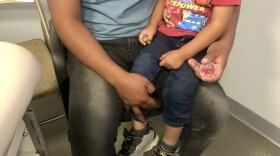People are protesting the U.S.ŌĆÖs treatment of immigrants, with vigils planned across the country for the night of Friday, July 12. Collectively, the national event is called ŌĆ£Lights for Liberty: A Vigil to End Human Concentration Camps.ŌĆØ
Toby Gialluca, one of s co-organizers, says ŌĆ£concentration campŌĆØ is a strong term, but thereŌĆÖs a reason they picked it: the definition in the dictionary.
ŌĆ£It is the concentration of a group of people in a space that is designed to segregate them from the rest of the population and is, generally speaking, inadequate as far as managing human needs,ŌĆØ says Gialluca, who is also a volunteer attorney working with migrants detained in Texas.
Major concerns include a backlog in processing asylum applications and bad conditions at detention centers.
ŌĆ£People are getting backed up in these places that are not designed for residential care,ŌĆØ says Gialluca. ŌĆ£ThereŌĆÖs no beds, thereŌĆÖs no running water, thereŌĆÖs not sufficient access to restrooms, thereŌĆÖs no showers, thereŌĆÖs no soap. TheyŌĆÖre overcrowded in these cages and itŌĆÖs turned into a humanitarian and a health crisis.ŌĆØ
According to a map assembled by the Freedom for Immigrants, there are about a dozen detention centers in our region:
Recent reports, including by the Department of Homeland SecurityŌĆÖs Office of Inspector General, ŌĆ£dangerous overcrowdingŌĆØ and ŌĆ£prolonged detentionŌĆØ sometimes far longer than the general 72-hour standard.
ŌĆ£This is an event that is allowing people to come together and present as a group saying, ŌĆśWe will not accept this. This is not the way we will allow our government or our country to function. We donŌĆÖt condone these kinds of human rights violations,ŌĆÖŌĆØ she adds.
The vigils have mushroomed from five to an estimated 500 worldwide. At least 15 of them are to happen in the Mountain West, including four in Colorado, one each in Idaho and Wyoming and three each in Montana, Nevada and Utah.
The events are planned to involve speeches, interfaith blessings and peaceful candlelight ceremonies starting at 9 p.m.
This story was produced by the Mountain West ░Ą║┌▒¼┴Ž Bureau, a collaboration between Wyoming Public Media, Boise State Public Radio in Idaho, KUER in Salt Lake City, KUNR in Nevada and KRCC and KUNC in Colorado.







